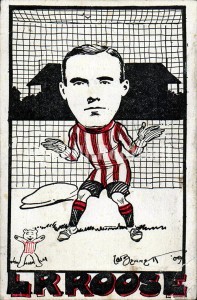Leigh Richmond Roose
A remarkable man Roose was born on 26 November 1877 at Holt, 5 miles East of Wrexham, Wales. His Father Richmond Leigh Roose was a Presbyterian Minister in the Village. It is almost certain that his Father would have kept company with the iconic writer HG Wells who worked as Teacher at Holt Academy at the same time. More than a mere goalkeeper Roose was also a renowned Socialite, Playboy, Trainee Physician and Soldier of his day. As a true maverick his brushes with authority became legendary. He is widely regarded as one of the finest footballers that Wales has ever produced.
At the age of 16 Roose was accepted to study at the University of Wales Campus at Aberystwyth where he wanted to study medicine. However it wasn’t long before he became better known as a remarkably talented goalkeeper for the University football team. By 1899 he was good enough to be mentioned as a possible selection for the Welsh national team, eventually making his debut for them against Ireland in the Home International Championships. Roose followed this up with an appearance for Town in the Welsh Cup Final of 1900 against Druids from Ruabon where he picked up a winners medal in a 3 v 0 romp.
Roose moved to London and by 1901 his performances in goal for club and country were attracting the attention of professional clubs; so much so that he signed for Stoke City in the October of that year. In a fixture at Manchester City Roose saved a penalty, gestured to the crowd and had an apple thrown at him. So began a maverick career that contained many legendary stories. Included was a visit to Sunderland where one of the home Directors made fun of the Stoke team. Roose’s reaction was to punch the man in the mouth; he was severely censured by the FA once the incident became public.
It was therefore ironic when he signed for Sunderland in January 1908. Many felt that this now plugged a gap left by Ted Doig when he left Wearside to join Liverpool in 1904. Roose had of course a claim to fame being the custodian for Sunderland in the 9 v 1 victory at St James Park. Roose kept the match ball and took it to London, presenting it to his Nephew. Its whereabouts is now unknown. Although he left Sunderland having made just 99 league and cup appearances his impact on the club was immeasurable. At the end of the 1907/08 season for example the Directors presented him with an “address” as a thank you for his performances. The book remains to this day in the hands of Roose’s family. As a further indication of the esteem with which he was held on his team mate at Sunderland, George Holley once described Roose as “the mould from which the rest were created”.
Roose caused a stir when he played as a guest for Port Vale in a reserves game against his former club Stoke City in 1910. Roose insisted on playing in his old Stoke City shirt and annoyed the opposition fans further by the turning in a Man-of-the-Match performance. The game ended in a riot.
Roose also insisted on wearing the same undershirt for every game – an old black-and-green Aberystwyth top – which was never washed for fear of bad luck.
The events surrounding Roose’s eventual death would remain a mystery for almost 90 years. The good Doctor had been assigned to the 9th Royal Fusiliers in France during WW1 following a spell as a military medic in Turkey. On 28 August 1916 he was awarded the Military Medal for bravery having been part of a successful allied attack on the Germans at a place known as Ration Trench and was promoted to the rank of Lance Corporal. Well known to all of his comrades at arms he became embroiled in The Battle of the Somme and died on the Western Front on 7 October 1916, following 99 days of consecutive fighting, mown down by a machine gun. As far as his family was concerned they had been told that Roose was missing in action, presumed dead, following his participation at Gallipoli in 1915. However the mis spelling of Roose’s name as Rouse in the official British War Records did not reveal his true fate, in France, until December 2006. The legendary Leigh Richmond Roose is remembered at Thiepval, the largest British War Memorial in the World designed by the influential architect Sir Edwin Lutyens.
Roose made his debut for Sunderland AFC on 18 January 1908 alongside another debutant Thomas Grey. This makes Roose the 184th player to have appeared in a first class game for The Black Cats






